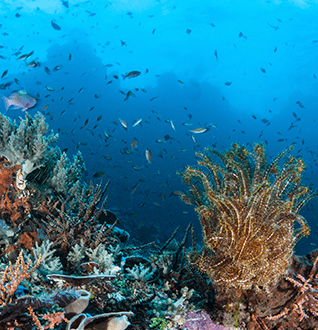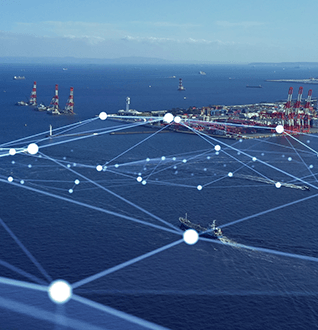The research will focus on assessing the physical processes occuring in the Ocean through hybrid computational schemes and technological innovations and evolution of new ideas and breakthroughs for the port and maritime sector.

Large-scale Ocean Research
The CFLOR will address the large-scale studies that are required to be incorporated in the design, testing and fundamental understanding of the complex ocean engineering problems. The novelty of the proposal lies in the development of a unique large-scale facility, one of the world’s largest testing facility that will be developed with the following features:
- Wave flume of length 500m, 8m deep and 5m wide, having a deep pit of 10m for testing large offshore structures,
- Current generation facility upto 1m/s,
- Towing carriage with speed of 10m/s,
- Wavemaker that could generate a significant wave height of 3m with its period ranging from 10s to 30s.
Thus, the proposed centre is an all-in-one facility catering to the need of studies in the following research areas that demand large scale investigations:
- High speed vessels, large cargo vessels – in Naval Architecture,
- Prototype controlled - coastal structure studies, sediment dynamics, Rehabilitation of coastal structures due to climate change,
- Offshore Engineering – Floating, TLP, Spar, Semi-submersible, Riser and mooring with a scale of 1:100,
- Renewable Energy – OTEC, offshore wind, wave energy devices,
- Underwater tow control systems,
- Transportation and launch systems and
- Tsunami modelling. Further, development of the state-of-the-art numerical models and making them available as open-source packages, particularly hybrid models that are developed to address large scale problems.
Finally, ‘Alliance of Large Wave flume’ will be formed, wherein transfer of knowledge and manpower will take place with the international partners.
Principal Investigator: V. Sriram

SMART Maritime Technology
Maritime Industry faces economic, environmental, energy and functional challenges that impact their sustainability. In response to the challenges, ports are adopting technology-based solutions, as well as new approaches to port operations planning and management. These initiatives are largely focused on special-purpose Information and Communication Technology (ICT) applications and regulation-based approaches in the setting of smart ports. Given the problems and the new and innovative initiatives on ICT it is essential to promote Research and Development initiatives in the maritime sector and implementation of research findings for improved development and growth of the sector. At present NTCPWC plays a lead and significant role at national level providing scientific support and carry out education, applied research and technology transfer to major, non-major and private ports. In addition, provide effective solutions to an extensive range of problems through indigenous and cutting-edge technology support in the Port and Maritime sector. NTCPWC envisages through SMATE – COE towards next step of contributing at Global level through substantial research works in the Digitalisation, Smart sensing and communications, Autonomous systems and Robotics, Intelligent navigation, Advanced data analytics and developing next generation smart ports.
Principal Investigator: K. Murali

